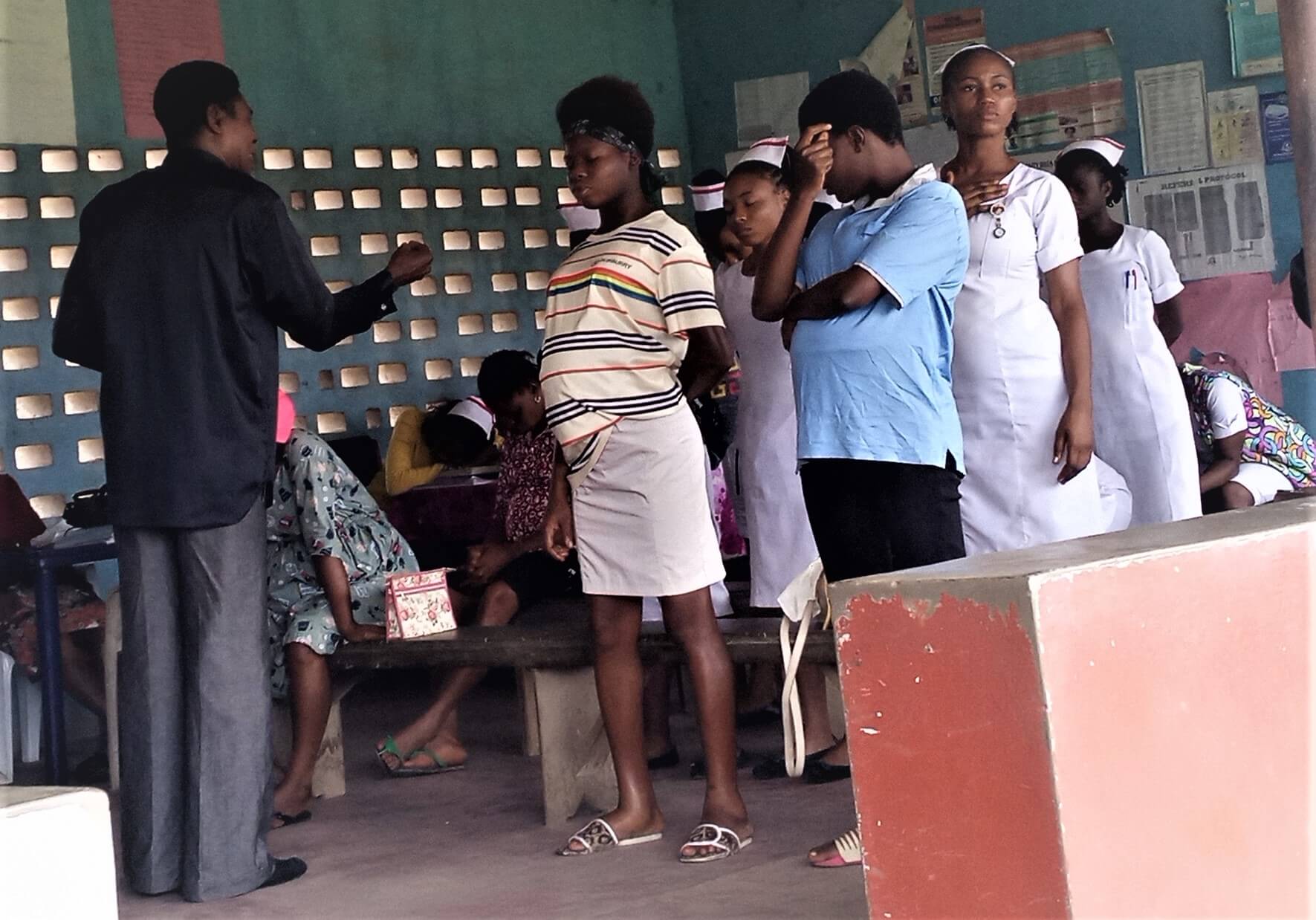CALABAR, CROSS RIVER: First-time pregnancy can be full of uncertainty and fear for most Nigerian women, especially in rural settlements where there is a shortage of unbiased pregnancy health information and access to quality healthcare due to years of underfunding in the health sector.
Most such pregnant women rely on untrained traditional birth attendants for care. And when complications beyond the attendants’ control arise, it could lead to child or maternal mortality, or both.
But it was a smooth journey for Esther Okon, who took a 15-minute drive from Adiabo, her village, to access antenatal care monthly at the Ikot Omin Primary Healthcare Centre in Calabar, Cross River, when she was pregnant between 2017 and 2018.
Thanks to the stage and age-specific pregnancy health tips she got twice weekly from “Hello Mama”, a mobile messaging system, throughout her pregnancy.
\
“It was like there was a doctor on my phone that knew what was wrong with me and had tips to help me cope all through the journey,” she said. “They sent me messages that told me what to do.”
Maternal deaths are female deaths associated with pregnancy and childbearing. Nigeria’s Maternal Mortality Ratio (MMR), at 556 deaths per 100,000 live births, amounts to 20% of all global maternal mortality. Cross River has one of Nigeria’s highest MMR burdens, with 876 deaths per 100,000 live births – 37% higher than the national average.
A magic phone doctor
To reduce the state’s MMR, in 2015, the United States Agency for International Development or USAID, in collaboration with the state government, launched Hello Mama. It was a localised version of the Mobile Alliance for Maternal Action (MAMA) that used text messaging services to improve health outcomes for pregnant women, newborns, and under-one children in Bangladesh, South Africa and India.
While MAMA – a collaborative effort between USAID, Johnson & Johnson, United Nations Foundation, mHealth Alliance, and BabyCentre (a global parenting resource platform) – ran from 2013 to 2015, Hello Mama was implemented between October 2015 and December 2018 with funding from USAID.
Pathfinder International, a global nonprofit that supports women in making their own reproductive health decisions, was the implementing partner. Pathfinder worked with BabyCentre to design pregnancy health tips as voice notes and text messages in English and pidgin and send them to enlisted pregnant women.
Before designing the messages, BabyCentre conducted several field visits and focused group discussions in rural and urban Cross River to review potential beneficiaries’ cultural and language contexts. It was from the research it knew that the women would understand messages in English and pidgin.
The voice notes and text messages aimed to spark vital health-seeking behaviours like the need for antenatal care, identification of danger signs, preparation for delivery, and exclusive breastfeeding.
Partnering with about 80 public primary healthcare centres in the state, Hello Mama enrolled consented women who came to the centres for antenatal care using mobile phones with unique codes for facility identification (to differentiate one facility from another).
The health workers obtained each woman’s vital data like their last menstrual period, gravida (the number of times she had been pregnant), the time, day, and the language (English or pidgin) they preferred to receive pregnancy tips in.
The healthcare workers then created a digital dashboard for each enlisted woman where her details and pregnancy stage-specific needs were stored. With the storage, the digital dashboard sent out scheduled messages to each woman at least twice weekly using an automated process.
Each enrolled woman received the messages throughout her pregnancy and a year after childbirth. Each tip told her what was happening in her body and advised her on specific steps at every stage.
“Headaches are common during pregnancy. If you have a headache, apply heat or cold to your forehead, [and] take a shower. If the symptoms continue, run to the hospital,” read one text message 33-year-old Anthonia Samuel received while pregnant in 2018.
The project also sent tips to relatives of the enrolled pregnant women for at-home support and care.
“They go as far as texting even their husbands to educate them on pregnancy…to improve health outcomes for pregnant women and newborns,” said Akpama Rose Archibong, public health and labour manager at the General Hospital at Mary Slessor Avenue in Calabar.
Hello Mama was part of a growing global industry called mhealth or mobile health, which uses mobile technologies to deliver health services and complement the efforts of frontline workers. The initiative delivered 5,900,000 messages via text and the outbound dialer system to 26,000 women to reinforce positive health-seeking behaviours.
“One day, I woke up with a slight pain in my belly and just as if someone was monitoring me, I got a call from Hello Mama. The voice told me that abdominal pain is normal, that most pregnant women have it at some point in their pregnancy,” said 29-year-old Offiong Orok, who was pregnant with her second baby when she benefitted.
“{It told me] if I experience abdominal pain, I should take a glass of clean water, and I will feel better. I did exactly as the voice told me, and after about 10 minutes, I did not feel the pain again. Hello Mama messages helped me know how to take care of myself throughout my pregnancy till the safe delivery of my baby.”
To encourage expectant mothers to honour their antenatal care appointments, the project sometimes gave them small cash gifts and products like pads, towels, umbrellas, and bags during their visits to clinics for antenatal care.
It also gave each woman a delivery kit (a crested bag with delivery essentials) in the labour ward to encourage more mothers to deliver in primary health care facilities.
“They gave me a bag that contained most of the things I needed for a successful delivery. It helped me as I could not afford some of the things in the ‘Hello Mama’ bag,” said Samuel.
Nkoyo Ekpenyong, chief health extension officer at Ikot Omin Primary Health Centre in Calabar, confirmed that “The gift items helped to increase the enrolment of pregnant women in our health facility.”
By 2018, the percentage of women receiving antenatal care from skilled personnel in Cross River had increased to 79.5% from 72.6% in 2013, and the number of women delivering in health facilities rose from 40.4% in 2013 to 52.6%, says the 2018 National Demographic Health Survey. Lucy Enakirerhi, assistant director at the family planning unit of the Cross River State Ministry of Health, agreed that Hello Mama partly contributed to the improvement alongside other state-run interventions.
Sadly discontinued
Despite the success, the project faced several challenges, including network fluctuations in some rural settlements that sometimes delayed the delivery of messages or stopped them from delivering at all. However, the biggest challenge was the government’s failure to continue the project.
The global partners concluded their commitment in 2018 and expected the state government to continue, which it agreed to do. But after committing N40 Million ($110,000) in 2019 and promising to do so yearly to sustain the programme, it failed to honour the pledge after 2019.
“Hello Mama was a wonderful project, and some of us wished that it was continued. But following the project’s conclusion by Pathfinder International, because it was a rigorous and cost-intensive program, it was unfortunately discontinued,” Enakirerhi said.
This story was produced with the support of Nigeria Health Watch through the Solutions Journalism Network, a nonprofit organisation dedicated to rigorous and compelling reporting about responses to social problems.
Calabar, Cross River: First-time pregnancy often comes with uncertainty for many Nigerian women, particularly in rural areas where there is limited access to quality healthcare and unbiased pregnancy health information. Many rely on untrained traditional birth attendants, leading to high risks of maternal and child mortality.
Esther Okon experienced a smoother pregnancy between 2017 and 2018 thanks to antenatal care and the Hello Mama mobile messaging system, which provided her with stage-specific health tips twice weekly. This service was part of a USAID initiative to reduce maternal mortality in Cross River, partnering with the state government and leveraging mHealth technologies.
Hello Mama, active from 2015 to 2018, was implemented by Pathfinder International and sent vital health messages in English and pidgin to pregnant women. The messages encouraged antenatal care, identified danger signs, and offered guidance on delivery and breastfeeding, helping to improve health outcomes.
Women like Anthonia Samuel and Offiong Orok benefited from the messages, which provided timely advice on common pregnancy issues. To motivate antenatal visits, the project also offered small incentives and delivery kits to expectant mothers.
Despite successful outcomes, including an increase in the percentage of women receiving skilled antenatal care and delivering in health facilities, Hello Mama was discontinued due to network issues and lack of sustained government funding. The program ended after global partners concluded their involvement in 2018, despite the state government's initial commitment to continue the funding.
This story was supported by Nigeria Health Watch and the Solutions Journalism Network, dedicated to reporting on responses to social problems.






